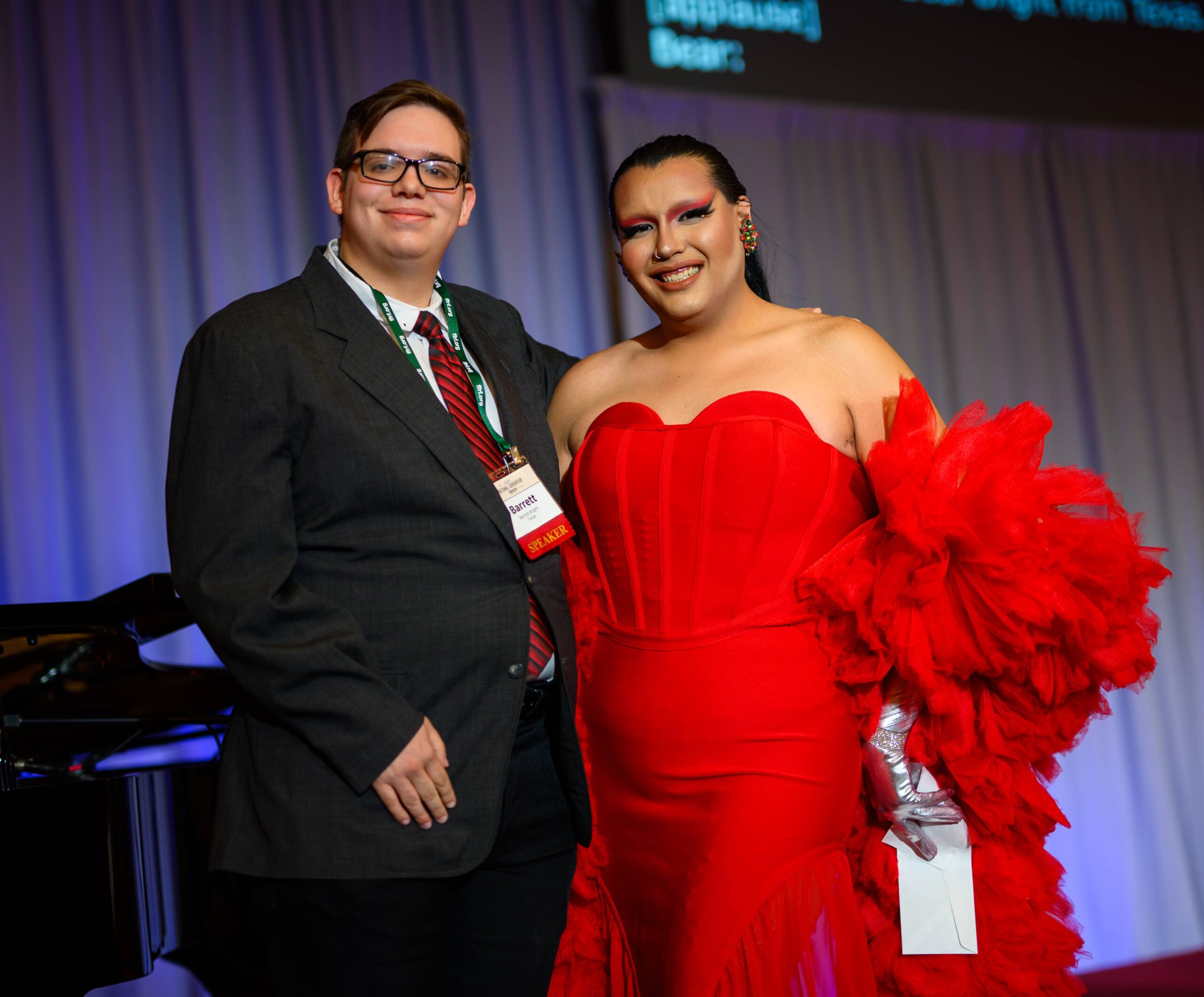

Student plaintiff Bear Bright receiving a $5,000 FFRF student activist award in October from Madison-area drag queen Latina Envy. Student co-plaintiff Marcus Stovall receives his $5,000 FFRF student activist award from Bryanna Banx$, also a Madison-area drag performer.
The Freedom From Religion Foundation has filed an amicus brief on behalf of the Secular Student Alliance asking an appeals court to lift a Texas A&M branch campus ban on drag shows. (The two students pictured above are principal plaintiffs in the challenge.)
West Texas A&M University President Walter Wendler earlier this year sent an email to students, faculty and staff with the subject line “A Harmless Drag Show? No such thing,” canceling a drag show scheduled for end-of-March to raise money for a nonprofit organization focused on LGBTQ-plus suicide prevention. Wendler’s email repeatedly cited his personal religious beliefs as a rationale for the cancellation. A federal judge lamentably ruled in September that Wendler’s actions did not clearly violate the constitutional right to free speech, and denied a request to enjoin the university from preventing the drag show.
The 5th U.S. Circuit Court of Appeals must overturn the district judge’s ruling, FFRF and the Secular Student Alliance contend.
“By placing an ongoing ban on drag performances, Wendler has engaged in unconstitutional viewpoint discrimination, creating a real and imminent threat to all student organizations whose members may wish to organize events expressing an opinion contrary to his own,” states the brief. “All government actors, including both university presidents and courts, have a constitutional obligation to step back from their preconceived notions of what drag is and to view each circumstance in its objective, factual and historical contexts. Both Wendler and the district court have failed in this regard.”
Now, the court of appeals has the opportunity to reverse the district court’s decision and ensure that the constitutional right to free speech of all West Texas A&M students is protected.
The amicus brief makes a number of persuasive arguments to press home its case.
First, Wendler censored student speech based upon his personal religious preferences. The U.S. Constitution places strict limits on when and how a government actor may utilize their power to restrict access to a government-run public forum. In addition to reasonable time, place and manner restrictions, government actors must apply only “narrow, objective and definite standards” when regulating speech. Restricting speech based upon its content is not permissible.
There is a subset of content-based restrictions on speech that are even more anathema to the free speech principle embodied in our First Amendment. “Government discrimination among viewpoints—or the regulation of speech based on ‘the specific motivating ideology or the opinion or perspective of the speaker’—is a ‘more blatant’ and ‘egregious form of content discrimination,’” the Supreme Court has stated. It is this “more egregious” form of discrimination that Wendler engaged in when he subverted West Texas A&M University’s neutral forum regulations and opted instead to censor the drag event based upon his own personal religious beliefs. If Wendler’s censorship is allowed to stand, it will create a very real and imminent threat to any student organization on the West Texas A&M campus who might dare to express an opinion contrary to President Wendler’s personal religious beliefs. The First Amendment cannot abide such a result.
Second, the brief contends that the district court’s assertion about there being no “intentional and overwhelmingly apparent” message involved in holding a drag show fundraiser ignores the history of drag and its modern application. As the brief explains, American ballroom-style drag performances, like the ones at the fundraiser, are historically rooted in protesting religious restrictions on the expression of gender and sexuality. The proposed fundraiser was no exception.
Plus, the current political climate in the United States, and particularly in Texas, continues to make drag shows inherently political acts that protest Christian nationalism. Anti-LGBTQ-plus legislation has increased exponentially in recent years. Texas alone has introduced 58 such anti-LGBTQ-plus bills so far this year — more than any other state. Many of these bills come from explicitly religious sources, such as the Alliance Defending Freedom, a well known Christian nationalist organization.
The current political context is important, because it makes the intended message of the fundraiser all the more apparent. It was formulated to be a show of support for the LGBTQ-plus community, and to offer messaging that counters the uptick in anti-LGBTQ-plus discourse. The district court’s decision to ignore this context when ruling that there is nothing inherently expressive about the fundraiser “is akin to ruling that there is nothing inherently expressive about wearing a black armband to protest the Vietnam War, because sometimes armbands are worn for fashion purposes,” the brief asserts.
For the above reasons, the brief argues that the 5th U.S. Circuit Court of Appeals must reverse the district judge’s decision. You can read the entire brief here.
The counsel of record is FFRF attorney Sam Grover, who is representing the Secular Student Alliance, which filed the case on behalf of Spectrum WT, the organization whose fundraiser was canceled.
Freedom From Religion Foundation is a national nonprofit organization with over 40,000 members and several chapters across the country, including more than 1,700 members and a chapter in Texas. Our purposes are to protect the constitutional principle of separation between state and church, and to educate the public on matters relating to nontheism.
